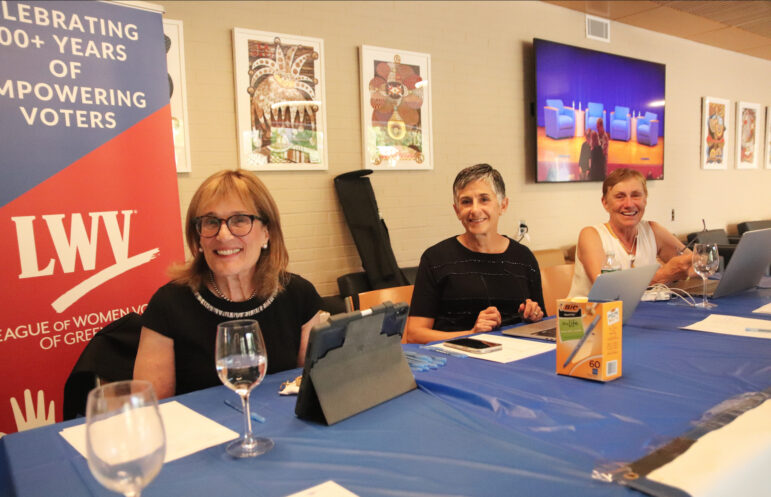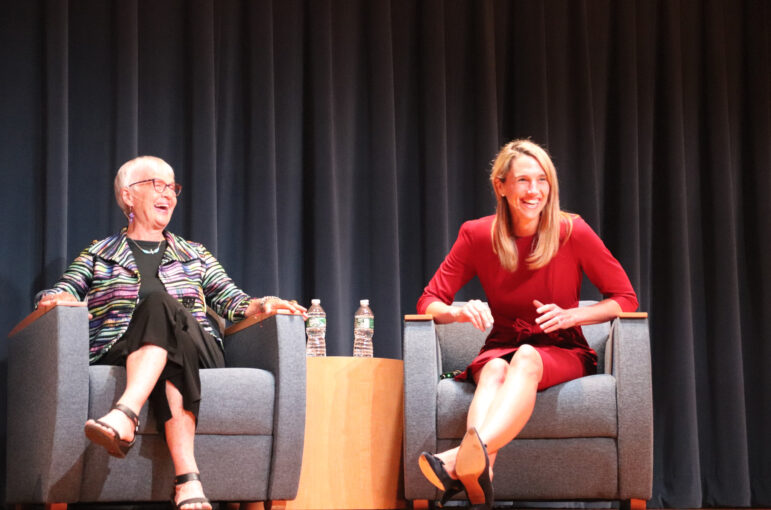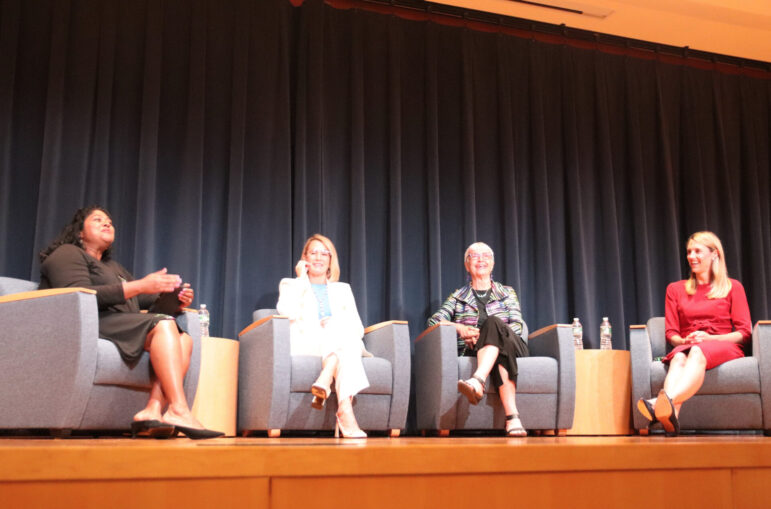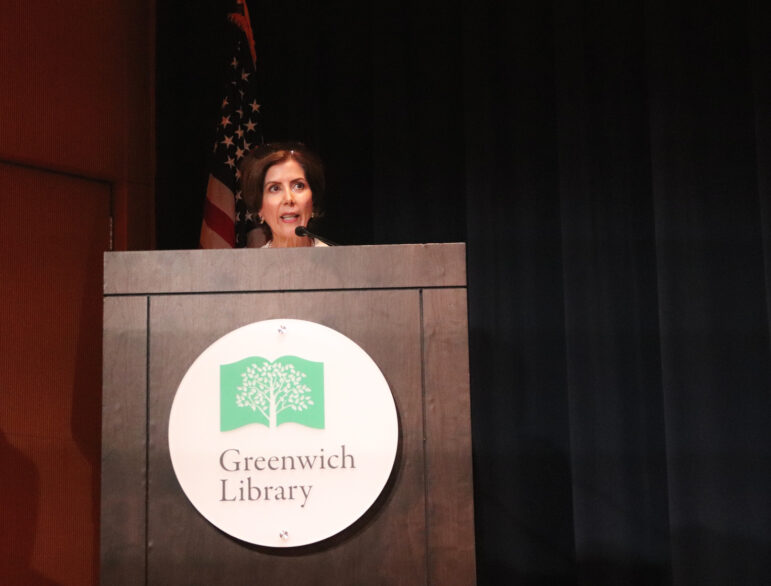One of the lighter moments during the League of Women Voters Greenwich discussion “Leading with Civility and Respect” Thursday night came when moderator Lucy Nalpathanchil from CT Public referenced a recent New York Times article about a Massachusetts woman who won a lawsuit against her town’s Select Board after her own rude behavior got her thrown out of a meeting.
The MA Supreme Judicial Court struck down as unconstitutional the town’s public comment policy which required public comment to be “respectful and courteous” and discourse “free of rude, personal or slanderous remarks.”
The woman had accused the board of ‘spending like drunken sailors’ and described one of the members as “a Hitler.”
The sold out panel discussion at Greenwich Library highlighted the unique role women leaders can play in bridging differences in politics.
Some of the topics included national news, social media, “fact based truth,” and how lack of civility discouraged people from running for office.
There was discussion about how both social media and mainstream media both encouraged and rewarded bad behavior.
Stamford Mayor Caroline Simmons, a Democrat who was the youngest female legislator when she represented the 144th district, and became the first female Mayor of Stamford in 2021, noted that social media algorithms targeted people with certain content and people are drawn to media with viewpoints they agree with to stay in their “media bubbles.”
Former CT House Minority Leader Themis Klarides said anonymous comments on social media deterred productive discourse.
“Just say who you are. Everybody is really tough on social media. When you run into them face to face, they don’t say a word to you. That’s what infuriates me,” Klarides said.
Nalpathanchil cited research from The Center for Media and Public Affairs and George Mason University, that determined the top viewed news sources in America including the New York Times and Fox News covered the most hyper-partisan and divisive politicians four times more often than their more bi-partisan and constructive counterparts.
“Marjorie Taylor Green is the most partisan member of Congress,” Nalpathanchil said. “She generated nearly 10 times the press coverage in the 2022 election cycle as the least partisan member of Congress, Nebraska’s Don Bacon.”
Nalpathanchil, who was the longtime host of Connecticut Public Radio’s morning talk show Where We Live, said civility meant different things to different people.
“Some people believe it is a tool to hold the marginalized down when they speak up against the status quo,” Nalpathanchil said. “When you look back on history, were the suffragettes seen as civil? Were civil rights activities considered civil? And even today, when we see movements like BLM, people also critique them for the way they’re trying to communicate what they see are injustices.”
Dr. Carolyn Lukensmeyer from National Institute for Civil Discourse said she researched the word civility, which first appeared in French in the 14th century.
“What it means was the duties and responsibilities of a citizen,” Lukensmeyer said. “We have lost the connection to what the core meaning of civility is.”


Klarides said for years she and Democratic House Speaker Joe Aresimowicz had many fights about what was best for the state of Connecticut, but they never got personal and they were great friends.
“We just had breakfast this morning,” Klarides said, adding that a lot of people in the legislature are friendly with their counterparts in the other party. “That’s how you get things done.”
“I have had knock-down, drag out brawls with people I didn’t agree with, including my own party. I will fight to the death for whatever I believe in,” Klarides said. “If you’re not going to fight, you shouldn’t be there. You can still be civil and fight for what you believe in.”
Klarides recalled her experience as a woman in her first campaign for office in Connecticut.
She said that between law school and running for office she worked as a swimsuit model. “I had to prove myself ten times more, that I was smart and that I was competent enough, because all they cared about was how you looked and what you wore. That’s exclusive to women….That’s way beyond being not civil, that’s being jerks!” she said to laughter and applause.
“I had an opponent and an opponent’s team who literally made up all sorts of things about me,” Klaries added. “That’s very common now, but it wasn’t common 24 years ago.”
What she said stung even more was that her opponent was a woman.
Ms Nalpathanchil noted that the way people respond to elected officials was a disincentive to becoming an elected official.
“You’ve got to be able to take it,” Mayor Simmons said, a reference to her campaign against Bobby Valentine. “I think it was a struggle… he claimed I was ageist, which I don’t believe I was. I claimed he was sexist in some of his commentary, about ‘What does a 35-year-old girl know about managing a city?’ and even some of the questions I would get during a campaign, ‘What are you going to do with your kids at home?'”
Simmons said her husband (former Republican State Senator Art Linares) didn’t get the same types of questions when he campaigned.
She said while barriers remained, women brought a level of civility to leadership roles.
“Women get things done. Let’s be honest. Women know how to juggle a million different things at once. We know how to work together for the future of our kids and future generations.”
Lukensmeyer said that after the 2016 presidential election her group received thousands of messages about how divided people were, including neighbors, colleagues and even family members.
“There’s no question that it is worse than it used to be,” she said. But, she added, “At the local level there is more positive work going on than we hear about.”
She pointed a finger at national media and social media who “continue to blast out how awful it is.”
Simmons said CT Capital Report was a “fun tabloid of Connecticut” but full of “clickbait and divisive news.”
“But if you look at the percentage of bills that pass on a bi-partisan basis, it’s about 90%. but it’s the divisive ones that get the coverage and the social media,” Simmons said.
“And our cable news has made a business model out of keeping us divided,” Lukensmeyer added. “It’s difficult to fight back against that.”
Lukensmeyer said curiosity was the primary motivation for starting good conversations.
“When the person who is a different party or philosophy says something that triggers you to react, literally take a deep breath, and ask a question,” she suggested.
“The goal is to learn more about why this person thinks the way they think. What in this person’s life experience brought them to hold a view I feel judgemental about?”
“Curiosity should be your motivation. Ask questions when you feel triggered. Don’t start the conversation unless you believe that you might learn something,” Lukensmeyer said.
Nalpathanchil asked at what point did civility became complicity as far as entertaining views someone finds morally reprehensible, such as bigotry.
“When people are jerks, you just tell them they’re jerks,” Klarides said. “You know it when you see it. Like the Supreme Court definition of pornography. You know when you see it.”
“I’m not saying you scream and yell and call names, but you say enough is enough,” Klarides said. “I find your opinion…I think you’re a bigot. I think you’re a racist That was a sexist comment you made, I’m not meeting with you any more.”
“All of us have issues where our blood boils,” Mayor Simmons said. “For me, it’s gun violence. It’s sort of infuriating to think about talking with someone with a totally different viewpoint, but the more we can bring empathy, compassion and curiosity to these conversations, the better off we’re going to be.”
Simmons said the rising level of violence against public officials was disgusting and upsetting.
“The words that leaders use matter,” Simmons said. “When we think abut January 6 and the violence that was incited by President Trump that was abhorrent and a dark moment for our country.”
“We need to set the tone around being peaceful, being respectful and setting the tone around civility,” she added.


“We’ve left the world of fact-based truth,” Lukensmeyer said. “Having left that space, it means anybody can put out anything they believe and treat it as if it has the same validity of actual facts.”
Lukensmeyer said it was down to voters to turn around the situation.
“It’s up to us to do something about that.”
During Q&A someone asked why it wasn’t against the law to lie in campaigning and politics. “I feel like Democracy is doomed if this doesn’t happen, Putin’s going to take over the world. Putin’s wife has said that control of the media is a weapon of war like a Kalashnikov.”
Lukensmeyer said she felt the country was at a critical point. “If there isn’t some accountability for lying in public office, or misrepresenting the truth, I’m not sure how we get out of this mess.”
Back on the topic of the media’s responsibility, Lukensmeyer said, “The media that is most trusted is local media. The focus in a lot of schools of journalism and among a lot of young journalists is how can we get investment in the country’s local media.”
“Without a trusted the media source, a democracy is really at risk,” Lukensmeyer said.